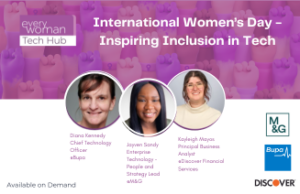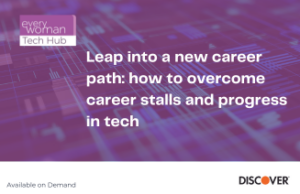
For Solution Architect Director Sandra Adamson, professional development has been pivotal to her 30-year career in designing and engineering networks for banking, insurance and government organisations — and with 21 of those years spent at Capgemini, she knows the value of investment, both personally and in an organisation. Her influence was further highlighted when she received Cisco Certified Internetwork Expert (CCIE) Lifetime Emeritus status in 2021. She shares what personal and professional development really entails and how raising the visibility of women in tech is crucial to powering everyone forward.
What did CCIE Lifetime Emeritus status mean to you and what has 20 years as a CCIE taught you about yourself and your career?
Lifetime Emeritus is awarded after 20 consecutive years of CCIE status, which begins by passing a written exam that provides eligibility for a lab exam. To remain active as a CCIE you need to take a written exam every two years, and after 10 years you can apply for Emeritus status, which I did, and kept it for a further 10 years. The CCIE exam is very well regarded in the networking industry and there are only around 65,000 CCIEs, so my status as ‘CCIE #8561’ means I’ve been at it for a long time! When the Lifetime Emeritus came up after 20 years, I popped it on LinkedIn and thought nothing of it — and my feed went mad. Over 290,000 people viewed it, and I was flooded with lovely messages from all over the world from women starting out in their career saying how inspiring my achievement was for them, and experienced professionals on how I was the first female CCIE Emeritus they had seen, never mind Lifetime Emeritus. One lady, who ran a Cisco Networking Academy messaged me to say that she gave free places away to women on her courses, but still couldn’t fill them because many don’t see that networking is a role that a woman can do.
After the initial shock of my 15 minutes of fame had worn off, I started talking with other women in Capgemini about how important it is to celebrate this sort of success. Women are woefully underrepresented in technology, particularly in networking, where only 9% of professionals are female, and possibly modesty is a factor in this. Women do not always make enough of their achievements in the workplace, and the more these things are celebrated, the more people will become aware of the significant contribution women are making in this area.
What is your secret to professional growth?
Know yourself, take considered risks, and find the balance that works for you. Prior to coming to Capgemini, I had always decided to leave previous companies when I felt I had done what the jobs could offer me at the time. At Capgemini, I’ve never needed to move anywhere else, because every six or nine months I’ve had something completely different to do to keep me interested. Technology has changed many times while I’ve been working in the industry, but there is always a core that’s the same, so for me it’s about acknowledging that core and expanding growth and stimulation around it. But that needs to be within boundaries that are comfortable, and everybody will be different around this. Ask yourself, ‘What are the boundaries that work for me?’ and ‘What will make me comfortable as I grow?’ I also think it’s important to look up from what you’re doing and work out how it fits into your career and the wider business. I’ve recently gone through a grade promotion panel where I had to demonstrate a list of evidence around my skills. That made me look at my job from somebody else’s point of view and that was an opportunity to re-evaluate what I do, how to develop that and to put myself in context in the business. That in turn allowed me to plan my own self-development going forward, because I could see where I might lack skills.
Is self-development the key to longevity at a company?
I love the phrase, ‘Talent is something we develop through practice; it is not simply there’. In a career, every step builds on the previous step. New opportunities are made up of cumulative experience and enough challenge to stimulate the intellect, while not over-stimulating the amygdala, the bit in the brain that processes fear — which is not a place you can learn from. What has kept me in Capgemini for 21 years is the huge scope of work and if you’re in the same environment, it’s much easier to grow and to take risks and to expand into different areas, because you don’t have to relearn the entire politics of a new organisation. Obviously, you need to be in an organisation that can give you the range of work to encourage you to develop though — if it’s a small organisation, you’re not going to get the same opportunities. It’s easier for me now to take bigger and bigger steps than it was when I first started here, because I know what support is available and that I can always ask for help if I need to. I also came across a University of Michigan study where it says, a sense of ‘belonging’ is important for men to flourish, but that it is vital for women — and after 21 years at Capgemini I certainly feel as if I belong!
What do you do to invest in yourself every day?
I remain curious and keep learning. In five years’ time, everything we do in the tech industry is going to be redundant because it is changing so quickly, so this mindset is essential. I’ve thought about my career plan for my next three years, and I make sure I am talking to the people who can help that plan become a reality. But what’s interesting is that you don’t always know what the significant pieces of information are necessarily. Sometimes I’ve been on a piece of work, and someone will ask an interesting question that brings a completely different area of focus. You never know where the insightful thought will come from, and you don’t necessarily learn from the places you expect to learn. So, you have to be with and listen to others to develop and grow. If I had a motto, I think it would be ‘Only Connect’ — I draw the dots, follow the path, look for the stepping stones and the things that are inextricably or tangentially linked. For me, the more you listen and absorb, the easier patterns are to find.
What have you learned about self-development through your career?
Women are often well-qualified for the next steps of their career but don’t always recognise it themselves. In the middle of last year, Capgemini began an initiative with Women on Boards — an organisation that supports the career progression of women by equipping them to take on non-executive Board and trustee roles — and I was in the first cohort. I have a strongly technical background so I thought I would struggle to find the skills that would be meaningful for these type of board roles. What I had failed to grasp is how much of my day-to-day work is eminently transferable — things like stakeholder management, governance, and risk management are all essential in my day job, and exactly the sort of areas that charity boards need as well. I now have a trustee role with a charity, but also a keener insight into myself. In the end, the self-development that can be needed for women can often be more a reframing of focus, to recognise that areas we as women often pay little regard to are the very areas that differentiate us and make us valuable.
What advice would you give around investing in yourself and in your career to someone starting out?
As part of the Women on Boards initiative we had a brilliant speaker called Kimberly Faith present to us. She said to keep a record, where every week you write down what you have done and noted that you will be amazed by what you have achieved when you look back over it. I aim to make notes every week, but twice a year I have to write down what I have been doing over the last six months as part of the company performance appraisal system. I am regularly surprised at how much I have achieved over that period, what new steps I have taken, what new opportunities I have had and how much I have learned. Investing in yourself is not exclusively about what new certifications you get, although these are great external measures of skills — it is also about recognising cumulative experience and new learning. It is the recognition and value these things bring that make us who we are.



